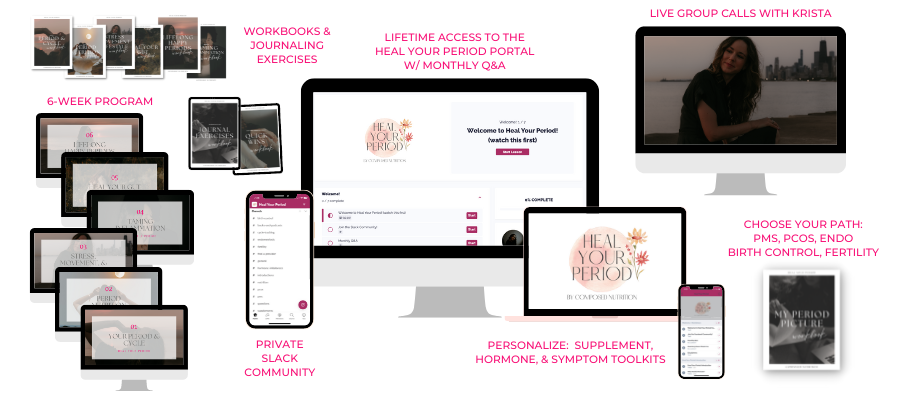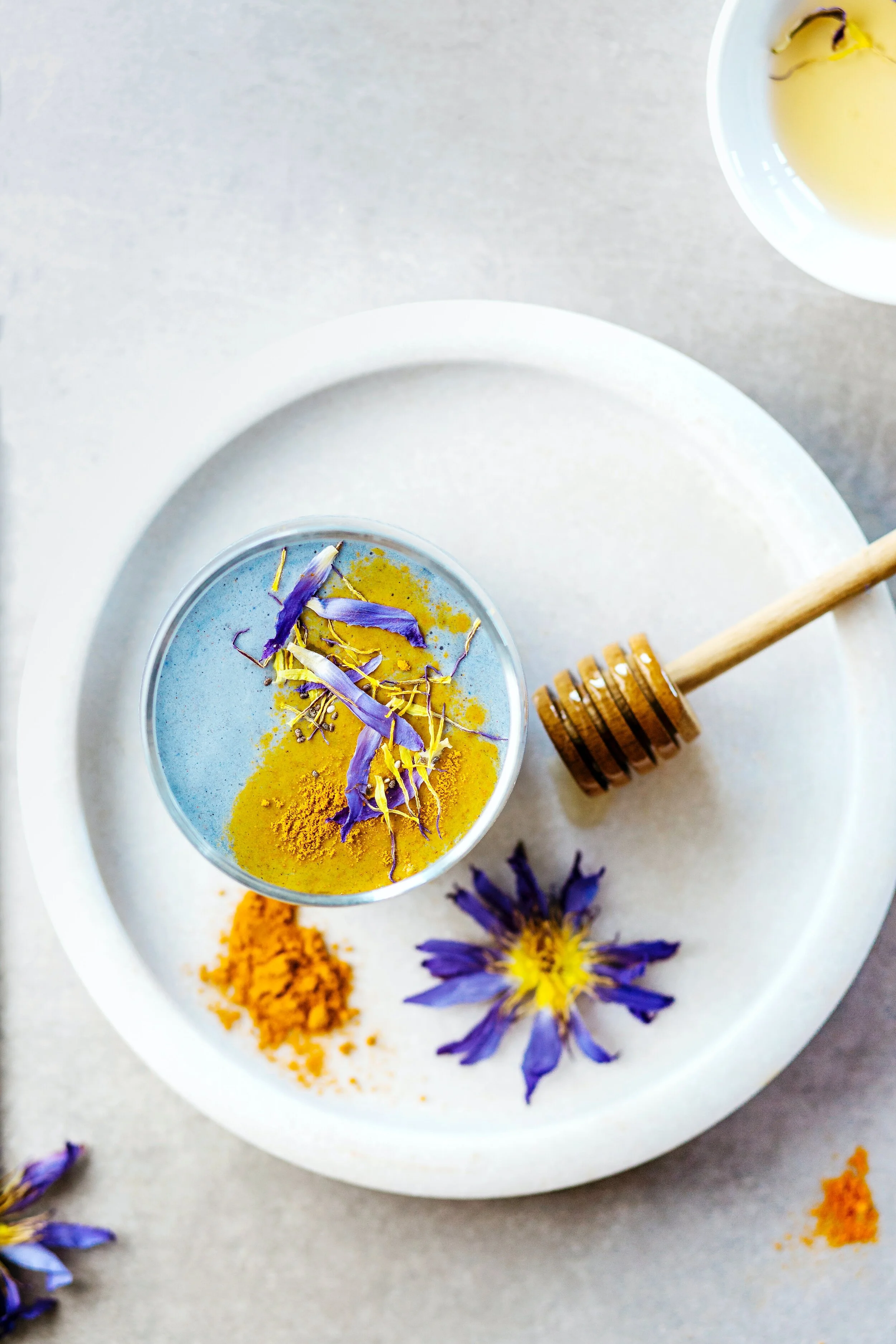20 Ways to Lower DHEA
DHEA stands for dehydroepiandrosterone, and it is one of your androgen hormones and is produced by your adrenal glands. Your adrenal glands are small glands that sit on top of your kidneys little hats and control your stress response.
Androgen hormones are hormones that are dominant in males and associated with more male-like traits, though androgens are also in females, just not as high.
The root cause of high DHEA levels often due to stress, which increases the demands on the adrenal glands to keep up and manage the stress response in the body.
There are other cases where DHEA is elevated due to a condition called non-classical adrenal hyperplasia, which is a genetic condition that can be assessed by a blood test for 17-OH progesterone.
You can see DHEA elevated in PCOS cases because one of the diagnostic criteria for PCOS is having elevated androgens. If you have high DHEA and have been diagnosed with PCOS, then stress management and adrenal health is an important focus area for you.
You may have also seen DHEA-S. DHEA is the active form of the hormone. DHEA-S is the inactive form (making up ~90% of the DHEA in your body). S stands for sulfur. So sulfur is added to DHEA to inactivate it.
Symptoms of elevated DHEA levels can include:
irregular periods
long menstrual cycles (longer than 35 days)
acne
hair loss
hirsutism (unwanted hair growth)
oily skin
irritability
depression
mood swings
difficulty losing weight
infertility
Lowering DHEA levels naturally means focusing on blood sugar balance, managing stress, and incorporating supplements as needed.
If you’ve gone to your doctor looking for a solution for your high DHEA levels, you may have been offered:
birth control
spironolactone
NUTRIENTS & HERBS TO EASE POLYCYSTIC OVARIAN SYNDROME NATURALLY
While there is definitely a time and place for medication, you’re wondering: “is there a way to lower DHEA naturally that I could try first?”
The good news (actually, great, amazing, fantastic news) is YES - there are absolutely natural ways to lower DHEA naturally.
This important question we need to be asking is: why is my DHEA high in the first place?
This is taking a root cause approach when it comes to understanding our health and hormones. When we answer this question, we are understanding what is driving the imbalance (which is showing up as symptoms in the body).
By addressing the root cause, not simply just the symptom (or the hormone imbalance for that matter), we can find long-term, sustained healing.
I’m here to help you have better periods, symptomless cycles, and optimize fertility (whether that’s now or in the future) all through simple nutrition and lifestyle shifts that feel simple, doable, and empowering (not overwhelming).
PRIVATE COACHING FOR BETTER PERIODS, SYMPTOMLESS CYCLES, & OPTIMAL FERTILITY
As always, I’m giving away my best hormone tips here, answering your burning questions, and letting you in on the what the science says.
This is the kind of insider info I share with all of my 1:1 coaching clients and students in my signature course, Heal Your Period.
I’m so passionate about sharing this info with anyone on a hormone healing journey, so I’m letting you in with all the info here!
So, let’s dive in into it!
PCOS ARTICLES
I have so many PCOS resources that it would be impossible to pack it all into this one article!
There is so much noise and confusion around nutrition and lifestyle shifts to manage PCOS with clarity and ease, which is why I’m so passionate about getting this info into your hands!
Click to view all of my PCOS articles
Work with Krista - explore how I can help you heal your period, say goodbye to hormone symptoms, and support your fertility with private 1:1 coaching or at-home hormone testing!
Are there ways to lower DHEA naturally?
Here are 20 natural ways to lower DHEA:
Nutrition
1. Adequate Protein
Adequate protein is essential to help lower DHEA. Protein is a macronutrient that, in simple terms, helps to build things in our body like muscle, mood chemicals, enzymes, and more. The macronutrient which takes the longest to digest is also protein. Eating enough protein can help stabilize your hormones estrogen and progesterone, which can lower DHEA, but eating enough protein at all your meals can help decrease blood sugar imbalances. When blood sugar is imbalanced, it can cause an internal stress response, driving DHEA levels up.
Source: 30774065
2. Hydration
Hydration is important to help lower DHEA too. Being hydrated helps numerous body systems occur, which can maintain homeostasis in the body. While hydrating, you decrease the risk of inflammation and internal stress in the body, which can lower DHEA.
Source: 21471383
3. Healthy Fat
Healthy fat is another macronutrient essential for hormone regulation. Healthy fats include monounsaturated and polyunsaturated fatty acids, which are necessary to maintain brain health, absorb nutrients, and regulate hormones. These healthy fats are found in fish, avocados, nuts, seeds, and olive oil. This is why consuming enough healthy fat can help lower DHEA.
Source: 26843151
4. Mindful Sugar
It is important to be mindful of added sugar intake when you want to lower DHEA. Added sugars found in candy, baked goods, and sauces can really impact blood sugar balance. The sugar in foods like fruits, potatoes, and corn should be eaten in plenty because this is not added sugar.
Source: 7598079
5. Blood Sugar Balance
Blood sugar balance, as mentioned, can impact your internal stress response, so it’s important to aid in blood sugar balance when you want to lower DHEA. Optimally, we want our blood sugar to be relatively stable throughout the day. Huge dips and dives in our blood sugar levels show that it is imbalanced. In order to lower DHEA, we can balance our blood sugar levels by eating smaller, more consistent meals throughout the day, and we can try to include a protein, healthy fat, and a carbohydrate source at every meal too.
Source: 23092890
Supplements
6. Zinc
Zinc is a mineral found in food that functions to grow and repair body tissues, supports the immune system, and helps many of the reactions that occur in the body. As one of the supplements to lower DHEA, zinc helps to balance androgen levels and can help with hirsutism, acne, and mood.
Source: 26315303
7. Reishi
Reishi is another one of the supplements that will help lower DHEA. Reishi is a mushroom, or adaptogen, that helps the body adapt to stress. A study looking at the anti-androgenic effects of 19 mushrooms, found that reishi mushrooms had the strongest effect inhibiting testosterone. Reishi has been shown to reduce an enzyme called 5-alpha reductase, which aids in the conversion of testosterone to dihydrotestosterone (DHT). High DHT levels are associated with acne and hair loss.
8. Magnesium
Magnesium is another one of the minerals which can help to lower DHEA. Magnesium is an excellent mineral for hormone production and regulation while modulating the effects of PMS. A study found that magnesium has been shown to relax smooth muscle in the pelvic region to reduce painful contractions and cramps. They also found that magnesium supplementation was linked with an inverse relationship to endometriosis risk, a condition linked to high estrogen levels. Another study found an inverse relationship between magnesium and estrogen, showing that when magnesium levels increased and estrogen decreased. When estrogen levels are low this means that there will be an increase in progesterone naturally and decrease DHEA.
9. Nettle
Nettle is also known as stinging nettle or urtica dioica and originates in all parts of the world, though you may have never heard of it. Nettle has anti-inflammatory, testosterone lowering, and blood sugar-lowering effects. A study on 40 women with elevated androgen levels found a significant decrease in total testosterone and free testosterone levels, which can be associated with lowering DHEA levels as well. Because nettle can assist with regulating blood sugar balance, this can help lower DHEA.
Source: 24273930, Semantic Scholar
10. Phosphatidylserine
Phosphatidylserine can also help lower DHEA. This supplement is a component of the cell wall that facilitates stress regulation, memory, and cognition. By lowering the stress response, phosphatidylserine can help lower DHEA.
Source: 25081826, Science Direct
Manage Stress
11. Meditate
Meditation is one of the ways to manage stress, which can lower DHEA. Even a short 3-5 minute meditation is a great way to clear out any stuck energy from the day. Meditation allows your brain to calm down and enter a state where theta waves are predominant. When we are awake and alert, our brain has beta waves. Alpha waves bridge beta to theta. Theta waves are where we experience deep relaxation. Try the app Insight Timer. There are some great meditations for sleep that can help you to relax before bed.
Source: 27313408
12. Journal
Journalling is another way to manage stress, which helps to lower DHEA. Writing down a simple entry a few times a week when you feel intense emotions can really help to clear negativity from your brain and body.
Source: 23211255
13. Clear Boundaries
Setting clear boundaries for yourself and with others may be another way to lower DHEA due to lowering stress levels. Setting these boundaries means that you know how much you can manage a certain stressor before you need a mental break. Allowing yourself to have boundaries means you are prioritizing your health and your stress levels.
14. Sleep
Making your sleep a priority is one of the ways to manage stress and lower DHEA. When we wake up in the morning, we get a burst of cortisol to motivate us to start the day and to get out of bed. Cortisol will decline to normal levels by midday and even more so decline when the sun sets so that you feel tired to go to sleep. Your cortisol levels should be at their lowest point. Many women do not have this cycle of cortisol because if they are not getting enough sleep or not getting enough quality of sleep, this can inhibit cortisol from dropping throughout the day, and it can cause a spike to occur before bed instead of in the morning. A cortisol spike in the evening may be behind your inability to fall asleep, nighttime racing thoughts, or insomnia. You should aim to make a comfortable sleep environment and practice a pre-sleep routine every day. Having a comfortable space to sleep includes having a proper temperature, blackout curtains or an eye mask, and comfortable sleepwear. All of these factors mean that you are prioritizing sleep to get the most quality out of it. Optimally aim for 7-9 hours and to cut screen time down 1-2 hours before bed to incorporate a wind-down routine.
15. Movement
Incorporate movement of any kind throughout your day is another one of the ways to manage stress and lower DHEA. Your movement can be yoga, walking, dancing, resistance training, running etc. Whatever feels best for you and is easy to stay consistent with is what you should do! It is important to note how you feel after you exercise to know if it's right for you. Especially with cardio, notice if you feel energized afterward or if you feel sluggish and depleted. If you are feeling the latter, it may be time to scale back on intensity. Exercise has been proven to help decrease stress levels overall and help you manage other daily stressors better than if you were not exercising.
Source: 24030837
Other Tips
16. Time for Self-Care
To lower DHEA, it is important to take some time for self-care. This can mean something different for everyone, but try to figure out what you have been putting off in your life that you desperately think you want. Have you been too strict on what you are eating and want to have dessert? Do you miss having your nails painted? When was the last time you hung out with a friend or family member? The answers to these questions can help you decide what you have been depriving yourself of and what you need to start doing to bring back in some fun and joy that will help reduce stress and DHEA.
17. Lower Caffeine
Cutting caffeine by noon is another way to manage stress and lower DHEA. It's common to reach for a cup of coffee if you feel an afternoon slump. Caffeine is a stimulant, and the effects of consuming later in the day can impact the ability to sleep and the quality of your sleep. This is because caffeine can increase stress levels as you drink it later in the day versus just in the morning. If you’re not getting good quality sleep you’re less likely to wake up feeling rested. Research supports that caffeine can impact the quality of sleep when consumed later in the day. Set a cut off time of 2 pm, opt for a non-coffee alternative, use a smaller mug, and limit caffeine as the day progresses for optimal sleep at night.
18. Gentle Exercise
If you find yourself getting drained by cardio instead of refreshed, then you may need to scale back on exercise and incorporate more gentle variations. Through chronic stress, any extra exertion throughout the day can drain us more, but we can improve our stress levels through the gentle exercise. Ideas of gentle exercise can be walking, yoga, swimming, and stretching.
Source: 24030837
19. Lower Alcohol
Lower alcohol intake is another way to lower DHEA. Alcohol is an inflammatory agent that upsets the digestive system and increases stress. Reducing your intake can significantly improve stress and keep DHEA low.
Source: 23729049
20. Avoid Skipping Meals
Relating to blood sugar balance, avoid skipping meals to lower DHEA. When you skip meals, you are going for more extended periods without any sugar in your blood, and your levels get very low. This makes you feel tired and sluggish, making you motivated to eat again. Once your next meal or snack enters your body, your blood sugar will spike up super high because you haven’t had food in a while. To combat this, try to eat more meals throughout the day to preserve blood sugar levels.
FINAL THOUGHTS
There are many ways to lower DHEA levels naturally.
While we chatted through lots of different options, remember that every body is unique and it’s about determine what works best for your body.
The main foundations when it comes to lowering DHEA naturally is focusing on blood sugar balance and supporting the stress response in the body.
Remember: simple shifts build to make a big impact over time!
Healthy DHEA levels are possible for you.
-Krista
ways to work with me
KRISTA KING, MS, RDN, LDN, IFNCP
If you’re looking for individualized support for period problems, PCOS, endometriosis, stopping birth control, and/or fertility I’m your person! I have select spaces each month for:
Krista is an integrative dietitian helping you have regular, pain-free periods, symptomless cycles, and optimal fertility! Together we cover: nutrition, exercise, sleep, stress management, cycle tracking, supplements, navigating doctor appointments, and lab testing.
My signature online program, Heal Your Period is open for enrollment!
This is your personalized solution for regular, pain-free periods, symptomless cycles, & optimal fertility (now or later), without complicated, soul-sucking protocols, lists of foods you can’t eat, or spending tons of $$$ on unnecessary supplements.
Heal Your Period is an online course with access to me to answer your burning hormone questions each month! Watch this for a special savings offer!
You may also be interested in:






































